Though Hamilton McWhorter was certainly a Great Man in his moments, I believe he was a Good Man during the rest of his life.
I was introduced to Mac in 2002 during my study into World War Two fighter pilots with the specific interest into what defined them as leaders, team players and successful individuals in the pressure of combat. Though I am still interviewing this distinct and powerful breed of man, of the 60+ in the docket, Hamilton McWhorter remains as one of my favorites.
As part of my interviews, I work to get beyond the "...and there I was at 15,000 feet, surrounded by..." stories. Knowing the character, values and thinking inside the young aviator and learning how (if at all) such things evolved over time, reveals lessons in growth for future generations - people who want to achieve, excel...basically "be good." Mac was always humble, always strong, always confident, always truthful...and always available. I got the impression Mac was somewhat thrilled with his celebrity status, but also considered it a responsibility as well. People talk about the athletic or entertainment star who always "seemed to have time for their fans"...if Providence had given Mac a .400 average or Oscar Awards, he'd have been the guy who stayed late to sign autographs and talk.
Joe Foss said, "It ain't braggin' if ya'done it." Mac had a way of sharing his exploits as if it were no big feat and anyone in the room could have, would have done the same.
Sifting through my interview notes, I came across a quote from Mac's wife, Louise - she stated that Mac, "...had no temper, no feud." Of all the great things Mac accomplished, Louise's blessing has to be the Hallmark that signifies a truly Good man - a man who could serve his country in war, yet remain humane and gentle to the ones who knew him best. In some ways, ANY person can have their moment of greatness, but it takes a really wonderful soul to have a wife of decades state such a thing about her husband.
Thank you Mac, for being a good example...I can only imagine that you were as excellent a father as you were a husband and servant of our country.
Sad for the loss, but impressed at such a rich life...I will think of you often.

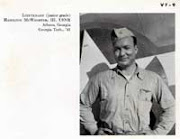

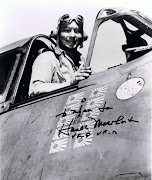





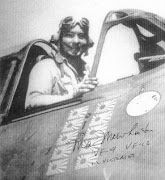


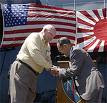
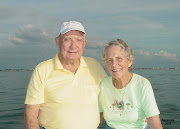

No comments:
Post a Comment